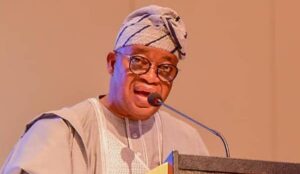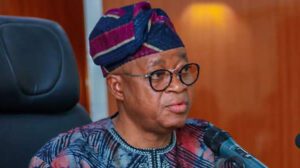
DMO presents N130bn sukuk cheque to FMWH, FCTA
The Debt Management Office, on Monday presented cheques of N130 billion being Proceeds of the 2022 Sovereign Sukuk offer to the implementing ministries.
The implementing ministries were the Federal Ministry of Works and Housing (FMWH) and the Federal Capital Territory Administration (FCTA).
The cheque were presented by Mrs Zainab Ahmed, the Minister of Finance, Budget and National Planning at a ceremony which held in her office in Abuja.
According to Ahmed, the issuance of sovereign sukuk, a project-tied debt instrument, is one of the many innovative and very successful initiatives of the present administration.
Ahmed said it was aimed toward financing development of critical infrastructure.
She said that the facts on how much the initiative had helped to improve road infrastructure across the country were glaring.
“As at date, this administration has invested the sum of N612.557 billion raised through Sovereign Sukuk between 2017 and 2021 for the construction and rehabilitation of key economic road projects.
“The projects are in the six geo-political zones and the FCT.
“In real terms, the amount has been used to construct and rehabilitate sections of 71 road projects covering 2,808 kilometers and four bridges by the FMWH.
“It has also aided the construction of sections of six road projects covering 99 kilometers and 19 bridges by the FCTA,” she said.
The minister said that FMWH and FCTA would be sharing N130 billion, being proceeds of 2022 Sukuk issue proceeds which was successfully issued by the DMO on behalf of the Federal Government.
She said that the release would form part of the 2022 budget, which implementation had been extended to March by the National Assembly
“FMWH will get N110 billion and the FCTA will get N20 billion.
“The N130 billion will be released as part of the capital expenditure in the 2022 Appropriation Act, which has been extended by the National Assembly to March 31.
“As at November 2022, N1.88 trillion had been released as Capital Expenditure, which represents about 40 per cent performance when compared to the total Capital Budget of N4.7 trillion.
“This informed the need to extend the period to implement the capital component of the 2022 Budget,” she said.
According to her, beside the immense contributions of Sukuk to the funding of critical road infrastructure, the objectives of deepening the domestic capital market and financial inclusion are being achieved by the government.
The Director-General of the DMO, Patience Oniha, said that the office started the journey toward issuing a Sovereign Sukuk some years back, diligently working with experts to get the process and documentation right.
According to Oniha, these efforts paid off with the issuance of the first Sovereign Sukuk of N100 billion in September, 2017.
“The DMO has issued Sukuk four more times bringing the total amount raised as at Dec. 2022 to N742.56 billion.
“From the Sukuk issued between 2017 and 2021, a total of N612.56 billion was raised and deployed to the construction and rehabilitation of sections of 71 roads and four bridges covering a total of 2,820 km,” she said.
She commended the implementing ministries and their various contractors for supporting the DMO in the Sukuk initiative.
She said that through the initiative, the DMO had demonstrated its strong alignment with the policy of President Muhammadu Buhari on infrastructure development.
“Furthermore, the DMO has positioned itself as an agency for managing the public debt including borrowing on behalf of the Federal Government.
“It has also become an active stakeholder in the domestic capital market through innovation, investor engagement and collaboration with other stakeholders.
“These have deepened the market, created benchmarks for other borrowers and promoted financial inclusion by providing a retail product, FGN Savings Bond, as well as Sukuk and Green Bonds for ethical investors,” Oniha said.
According to her, the DMO remains committed to its mandate and market development activities.
The Minister of Works and Housing, Mr Babatunde Fashola, said that the Sovereign Sukuk had contributed immensely to raising badly needed funds for roads projects across the country.
Fashola said that various construction companies, which had laid off many of the staff due to redundancy had recalled most of the staff members, partly due to the funding support from Sovereign Sukuk.
He commended the former finance minister, Mrs Kemi Adeosun, the incumbent Minister of Finance, as well as the DMO director-general for initiating and sustaining the Sukuk initiative.



